This post may contain affiliate links. Please read our disclosure policy.
This is the base scone recipe I spent weeks perfecting—testing flour ratios, mix-ins, and butter techniques to help you make tall, flaky bakery-style scones at home. I even figured out how much extra flour you need based on your add-ins, so you’ll get the perfect texture every time.
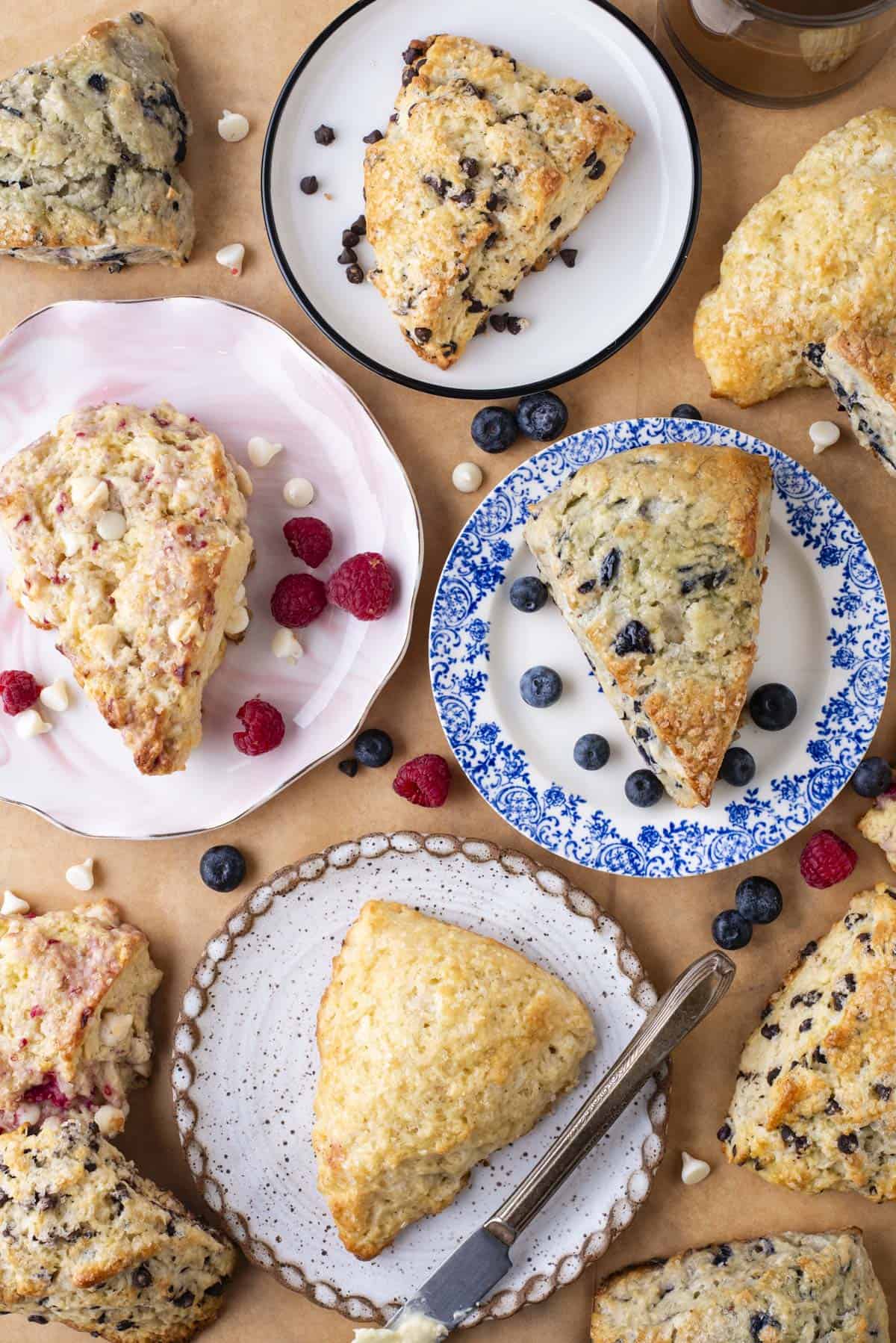
This was so good! Made 3 recipes! Blueberry, strawberry and raspberry! To make it easier I shredded the butter and kept it in the freezer until I needed it! But easy recipe and super good!
-Josephine
This is the master scone recipe I spent weeks testing—tweaking, troubleshooting, and perfecting every detail so you don’t have to guess your way through it.
I didn’t just stop at creating a great plain scone (though it’s buttery, flaky, and melt-in-your-mouth tender on its own).
I also tested how different add-ins—like blueberries, raspberries and chocolate chips, affect the dough and I figured out exactly how much extra flour to add depending on what you mix in. Because yes, juicy berries and heavy add-ins can totally throw off the texture if you don’t adjust!
This recipe is designed to be your go-to foundation, whether you’re making lemon poppy seed scones, blueberry almond scones, or anything in between.
With clear step-by-step instructions, pro tips for avoiding dry or flat scones, and options for customizing flavors, this is the kind of recipe that builds your confidence. It’s bakery-worthy, but approachable—and tested to work every time.
What is a scone?
A scone is a baked pastry typically made with flour, baking powder, butter, milk, and sometimes eggs. They can be made sweet or savory using different add-ins like fruit, nuts, or cheese. They are typically served for breakfast but can also be a dessert.
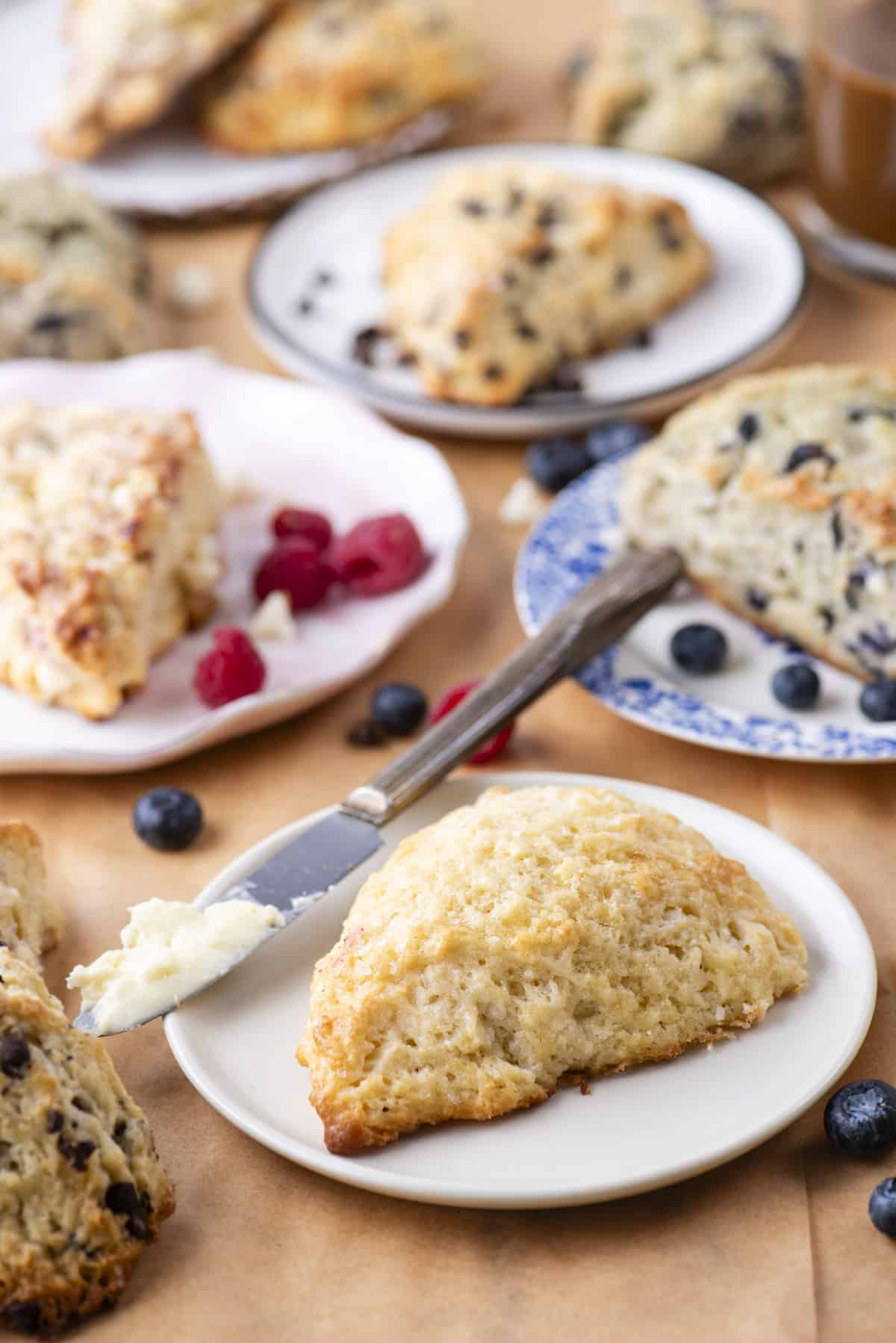
Scone vs Biscuit
Traditional English scones are more like what we consider biscuits in the US. These are often topped with butter or jam when served. American scones are sweeter and more like a dessert. Here are some key differences between biscuits and scones:
- Taste and texture: Scones typically have a more crumbly texture and a sweeter taste, while biscuits are more soft and savory.
- Add-ins: Biscuits don’t typically contain any add-ins, while scones are known for having add-ins like fresh fruit, nuts, or even savory ingredients like nuts or cheese.
- Shape: Biscuits are normally round while scones are normally cut or shaped into wedges.
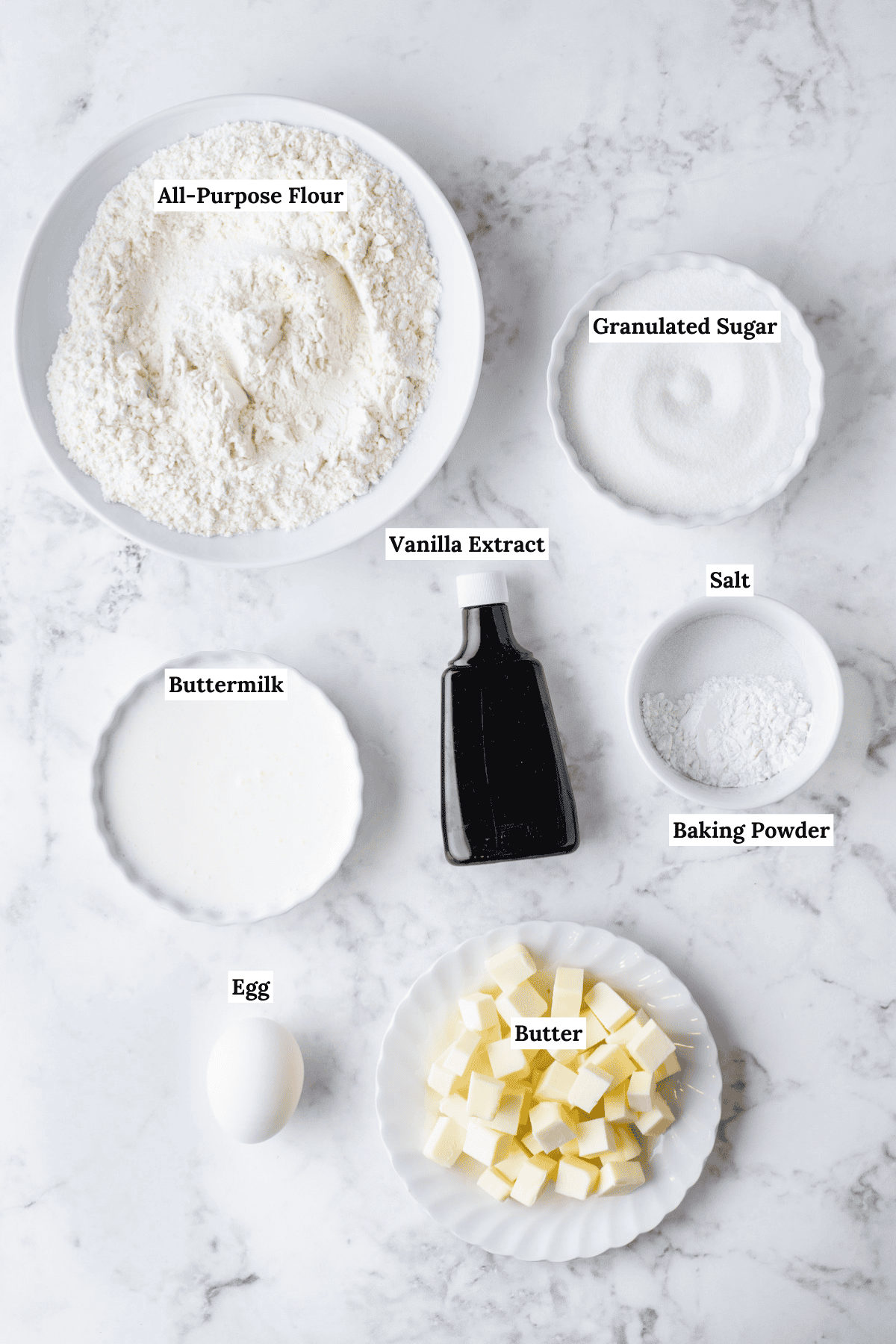
Scone Ingredients
This base recipe uses very simple ingredients. You likely have most of these on hand already. Get the full recipe in the recipe card below. Here’s what you’ll need:
Plain Scones
- All purpose flour, 270 grams
- Granulated sugar, 99 grams
- Baking powder
- Salt
- Unsalted butter: cubed, cold
- Buttermilk
- Vanilla
- Egg
What if I don’t have buttermilk? What can I substitute?
If you don’t have buttermilk, follow my DIY buttermilk tutorial. Or recommend substituting heavy whipping cream or slightly thinned-out sour cream. Use the same amount as you would buttermilk. I do not recommend substituting whole milk, almond milk, or any other dairy product.
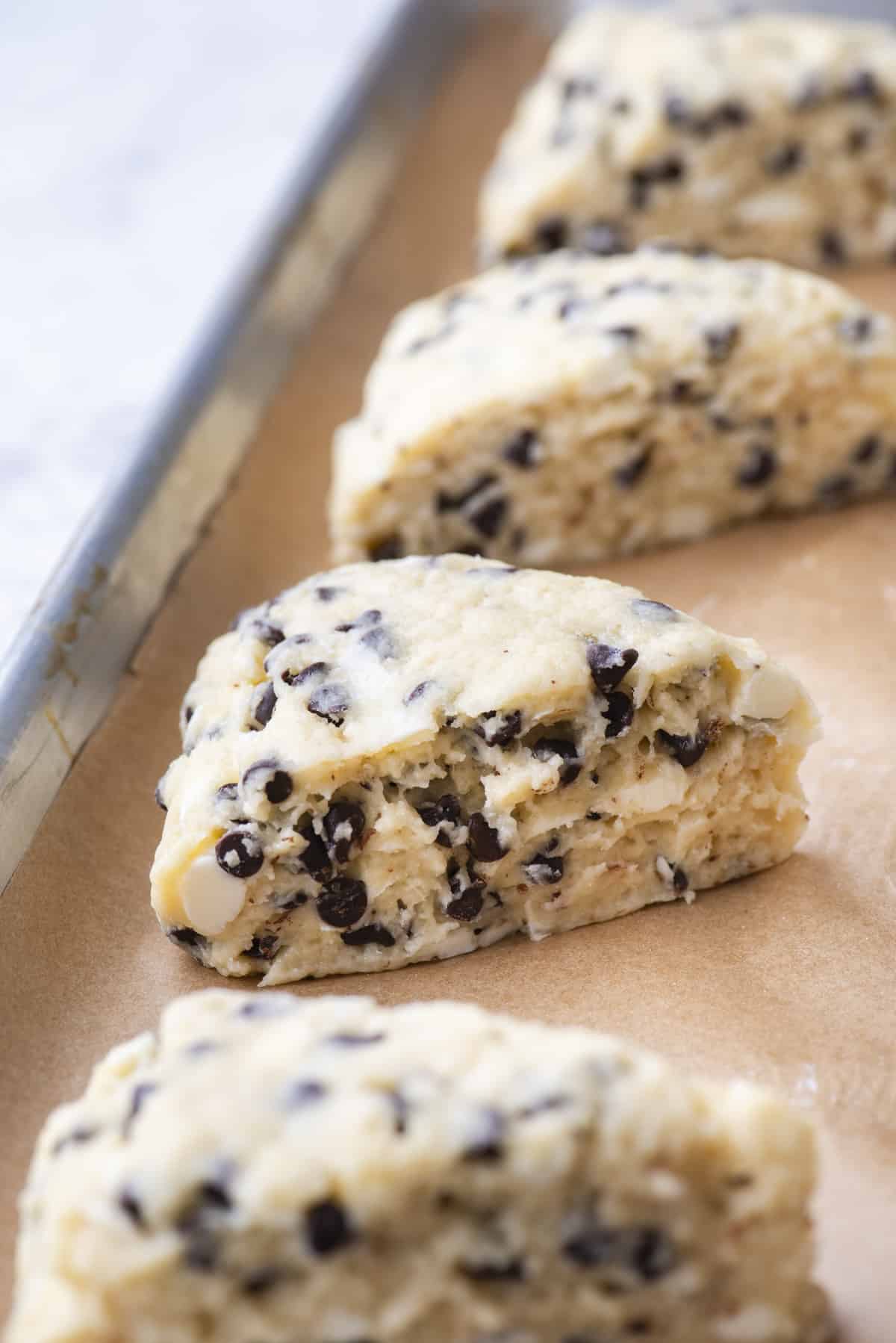
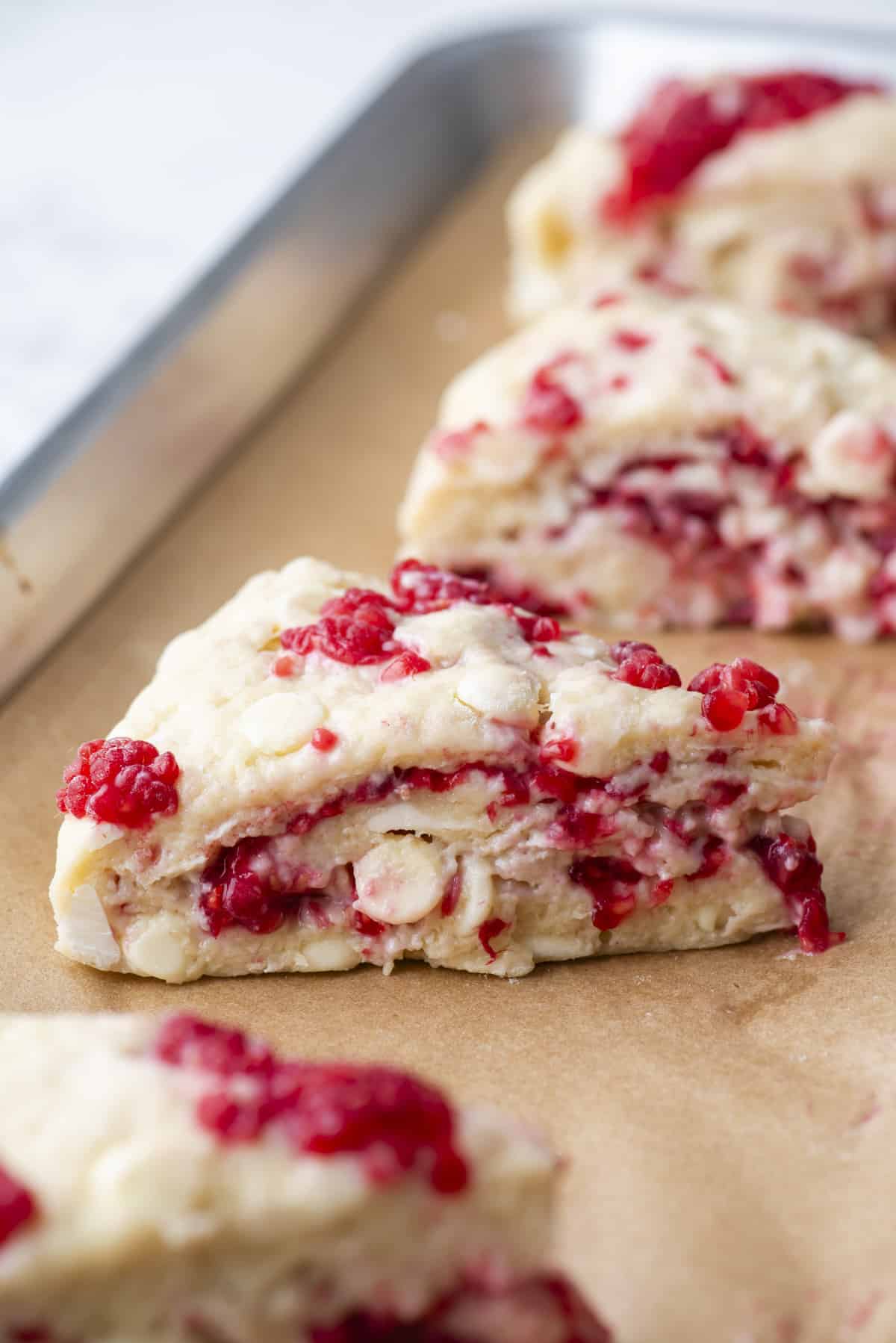
Add-Ins (optional)
If you choose to add ingredients to flavor the scones, add a total of 1-1.5 cups of your chosen add-in. Read the tips below for more specifics on adjusting the flour ratio for different add-ins. Here are some add-in ideas:
- Chocolate chips: I used mini chocolate chips in the photos.
- White chocolate chips
- Fresh raspberries: broken into pieces and frozen
- Blueberries
- Strawberries: chopped
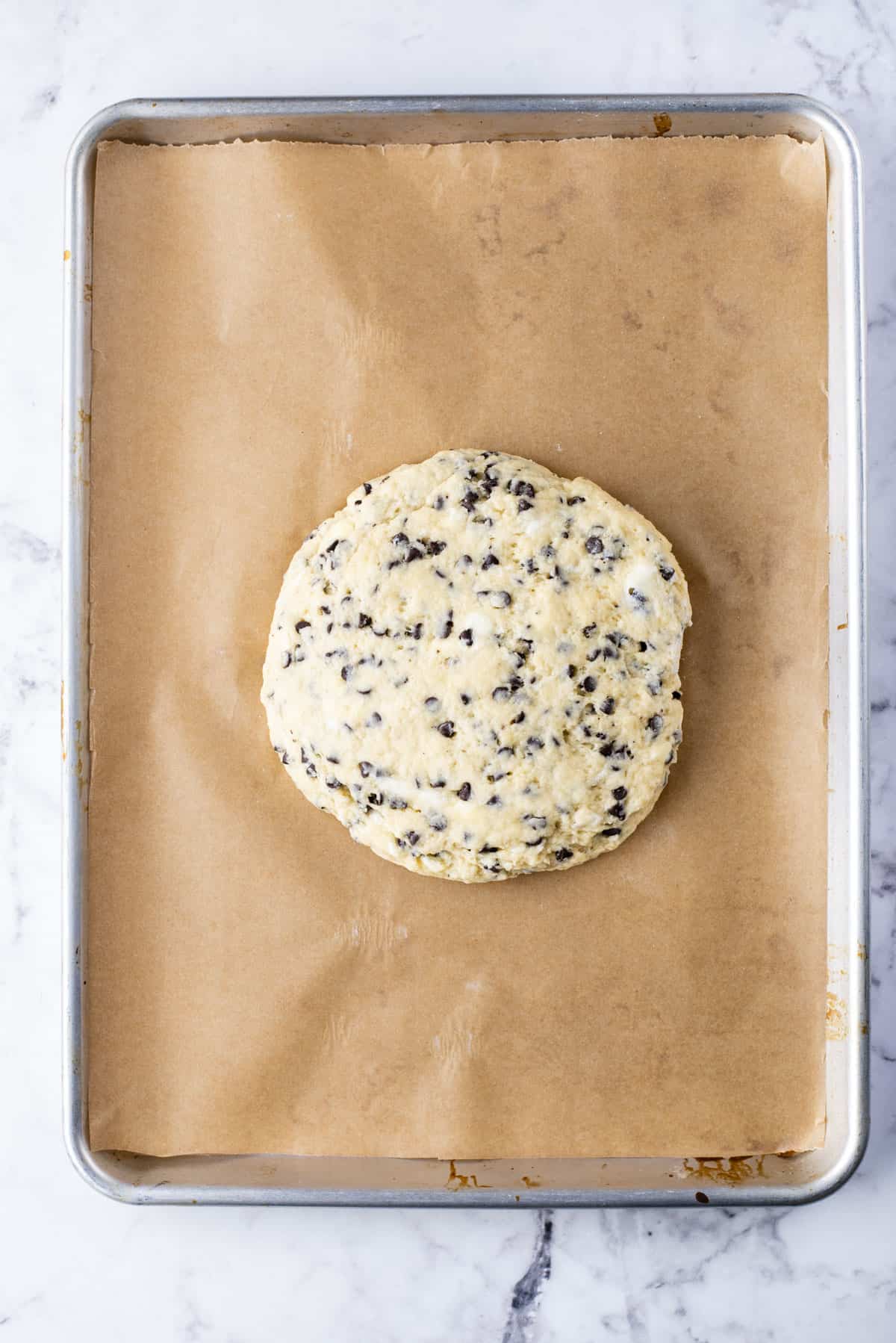
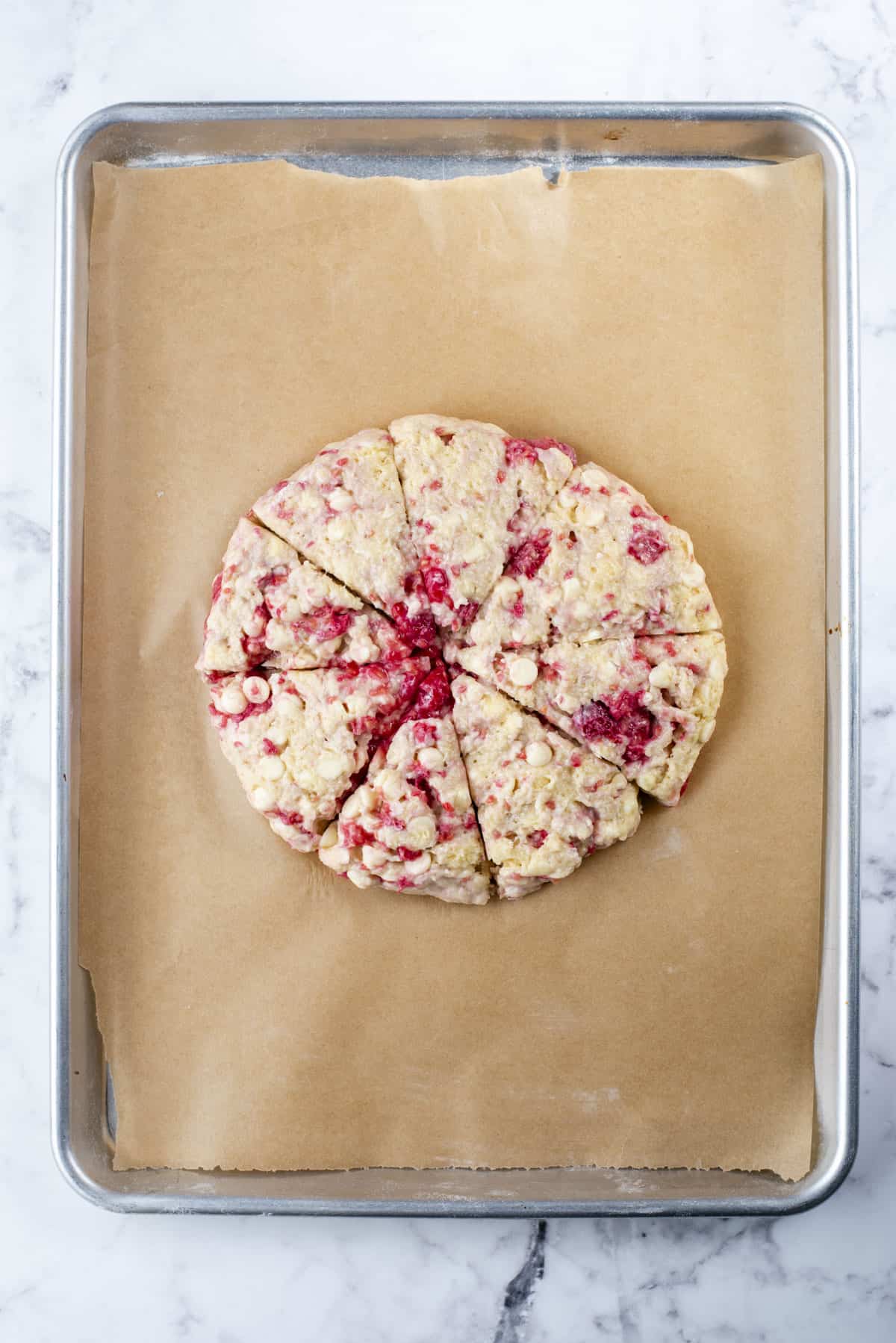
How to Make Scones
Once you impress your friends and family when you make these tasty, tender scones, you don’t have to tell them how easy they were to make! Follow my step-by-step recipe to make the best homemade scones:
- Adjust flour for fresh fruit. If making raspberry scones add an additional ¾ cup flour (90 grams). If making blueberry or strawberry scones add an additional ¼ cup flour (30 grams). The fresh fruit adds a lot of moisture so more flour is needed otherwise the dough will be very wet and not have enough structure when baking.
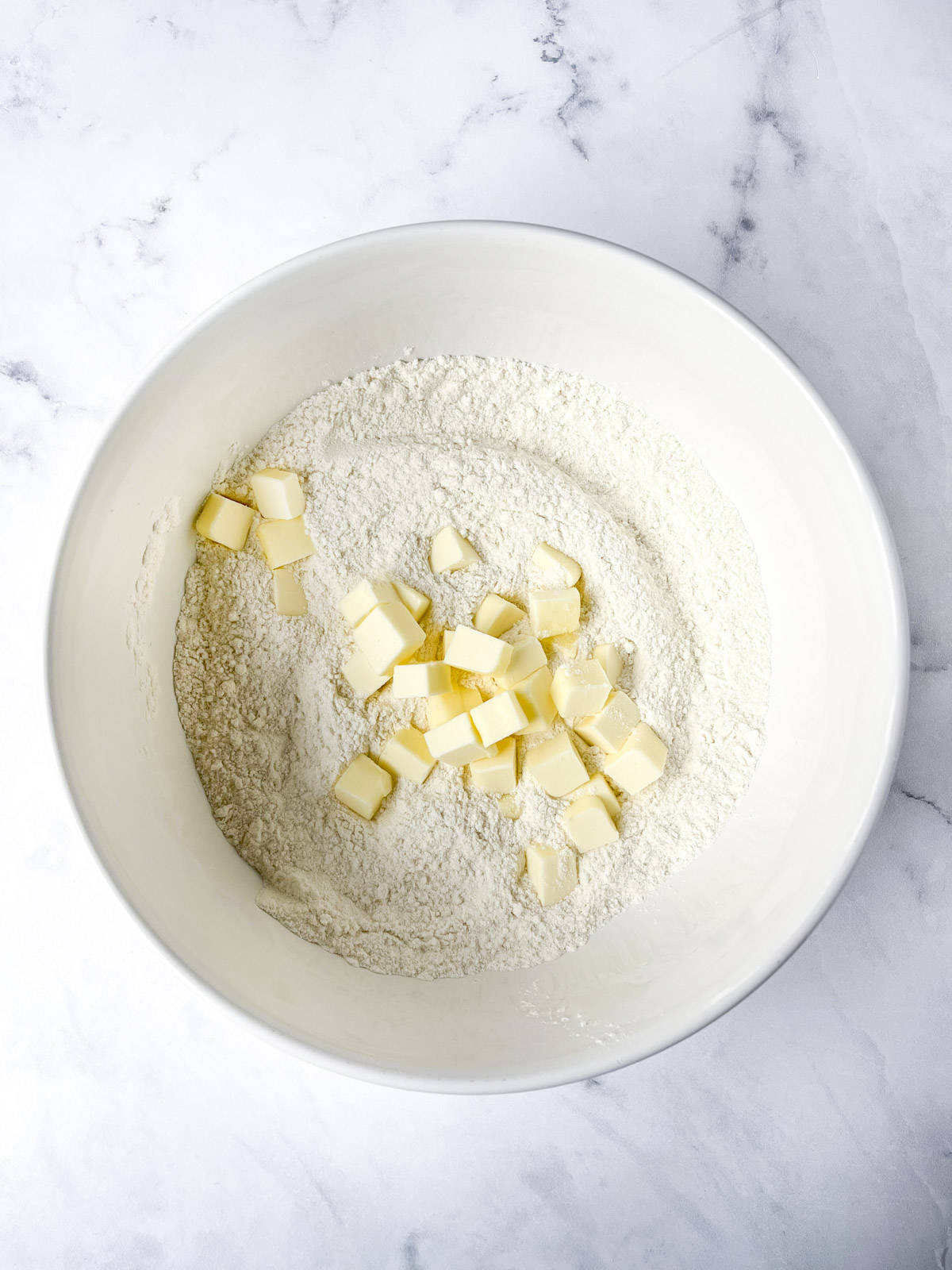
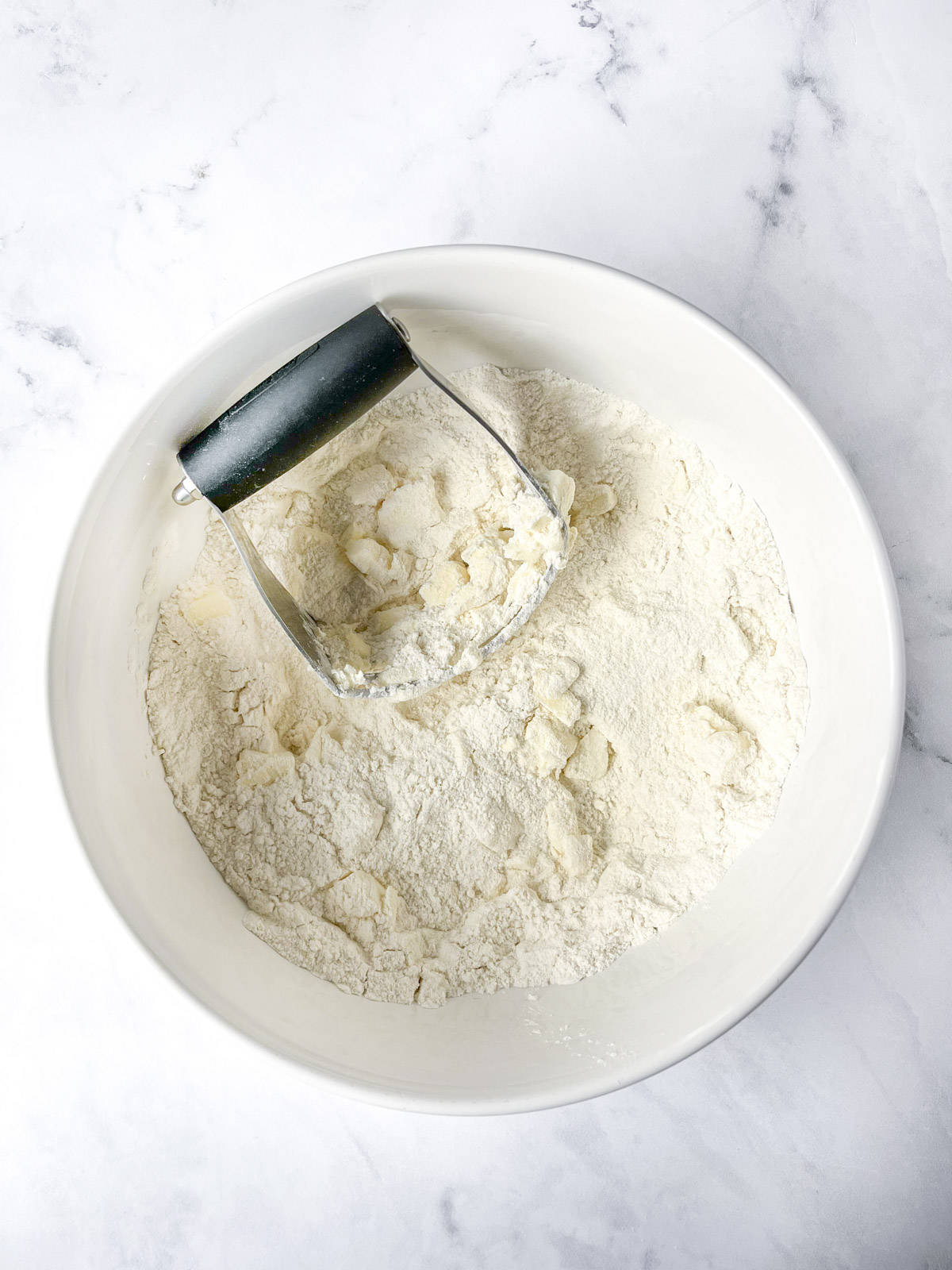
- Mix dry ingredients and butter. In a large bowl combine the flour, granulated sugar, baking powder, and salt. Add in the cold, cubed butter and use your hands or a pastry cutter to cut in the butter until pea-sized amounts of butter remain.
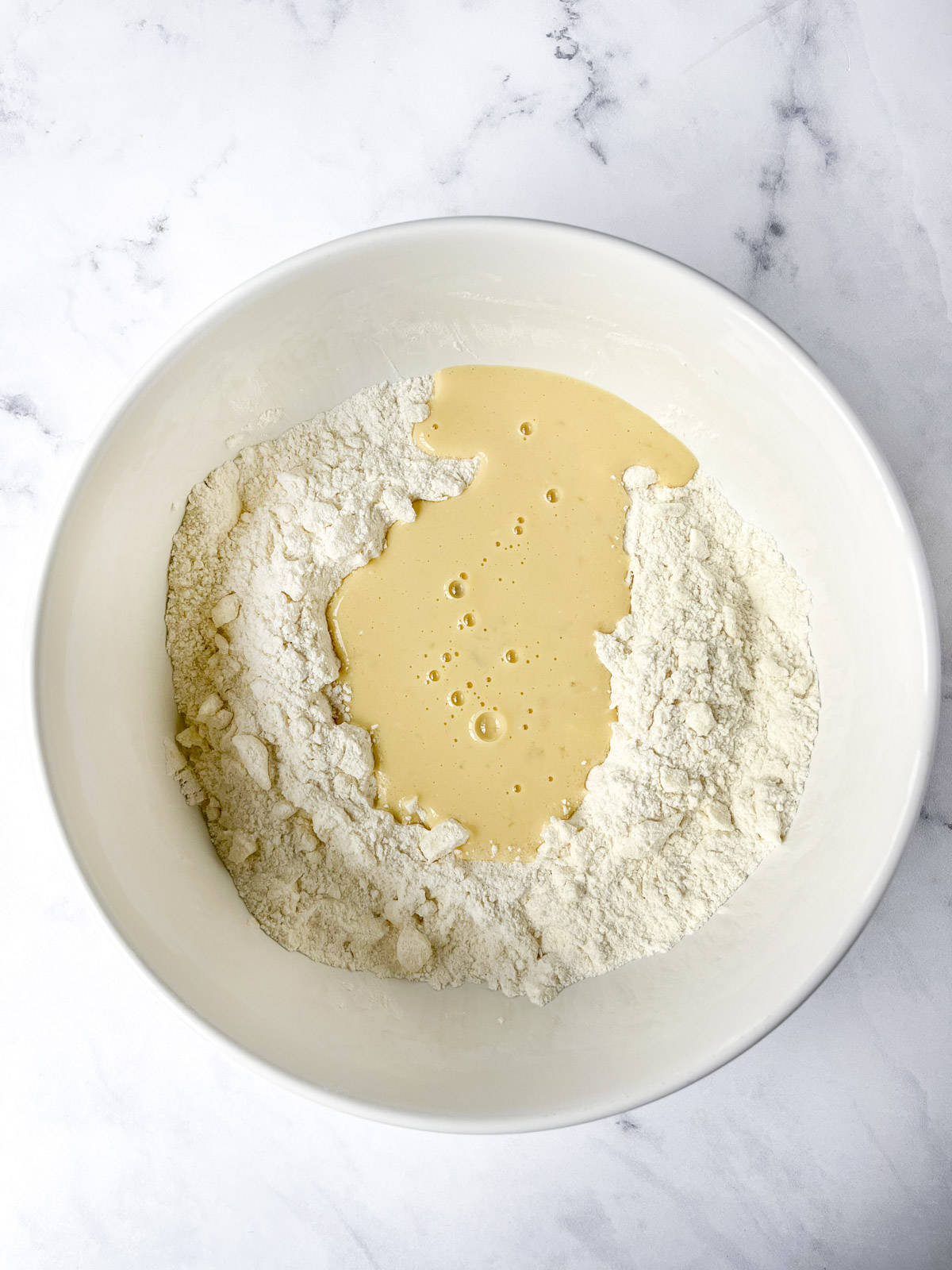
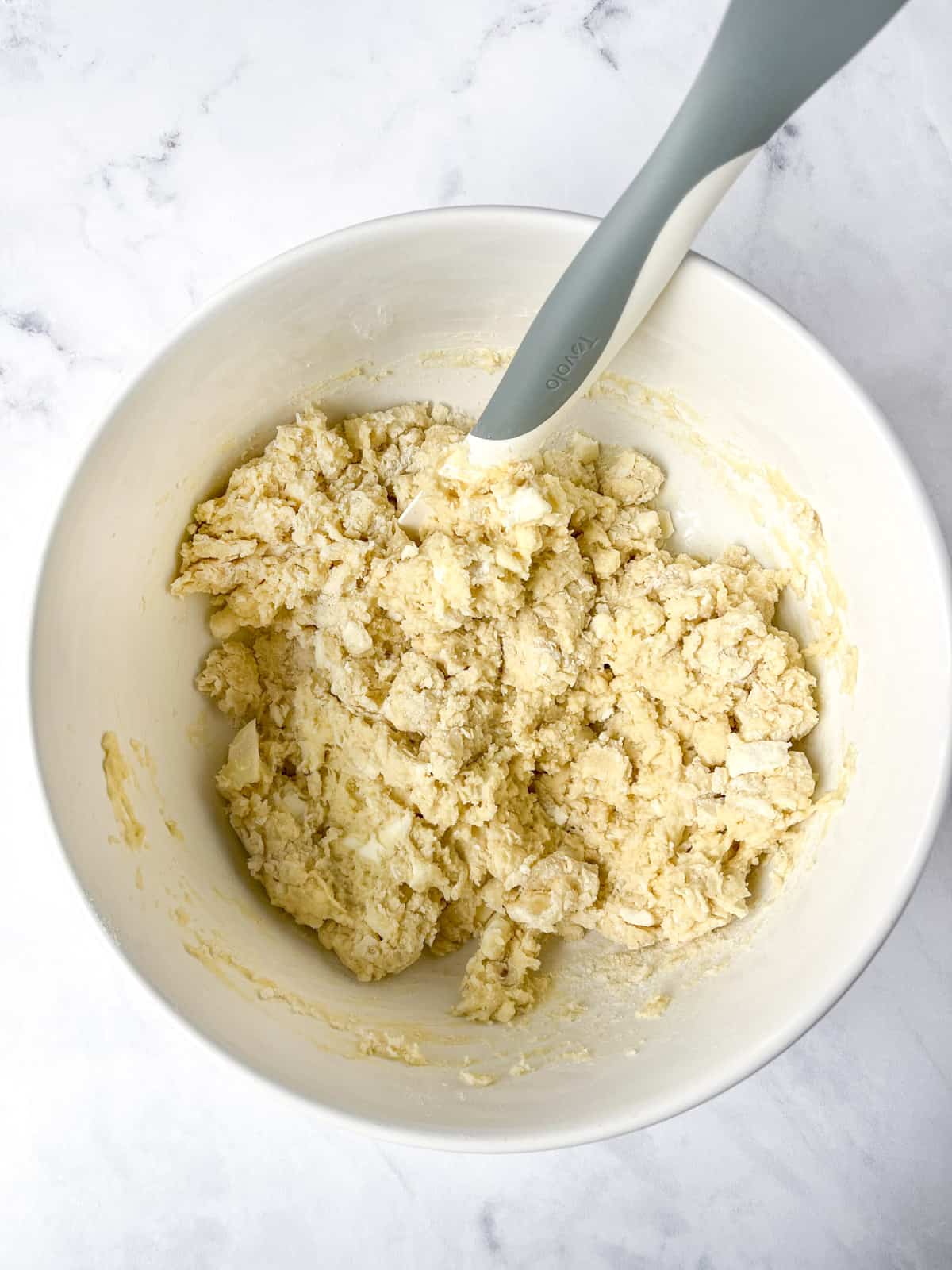
- Add wet ingredients. Create a well in the center of the flour mixture. Add the buttermilk, vanilla extract, and egg. Use a spatula to gently combine until the dough is thick and sticky. Gently stir in your mix-in if using – for example 1 cup chocolate chips, 1 cup fresh raspberries, broken into pieces and frozen, 1 cup blueberries, OR 1 cup strawberries, chopped.
- Knead dough. On a silicone mat or kitchen counter, gently knead the dough, until all the flour is incorporated. Add 1-2 additional tablespoons of flour if the dough is too sticky.
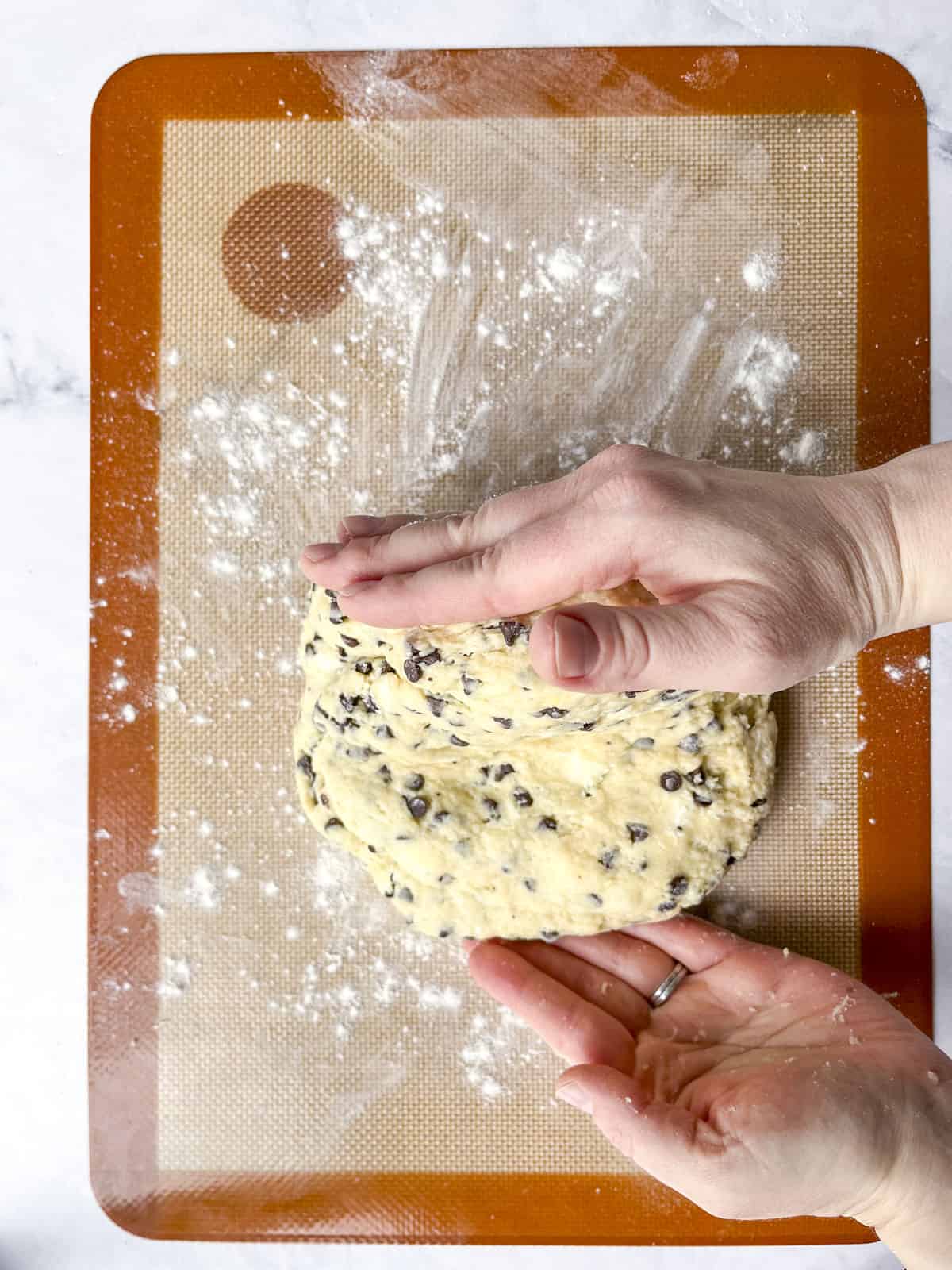
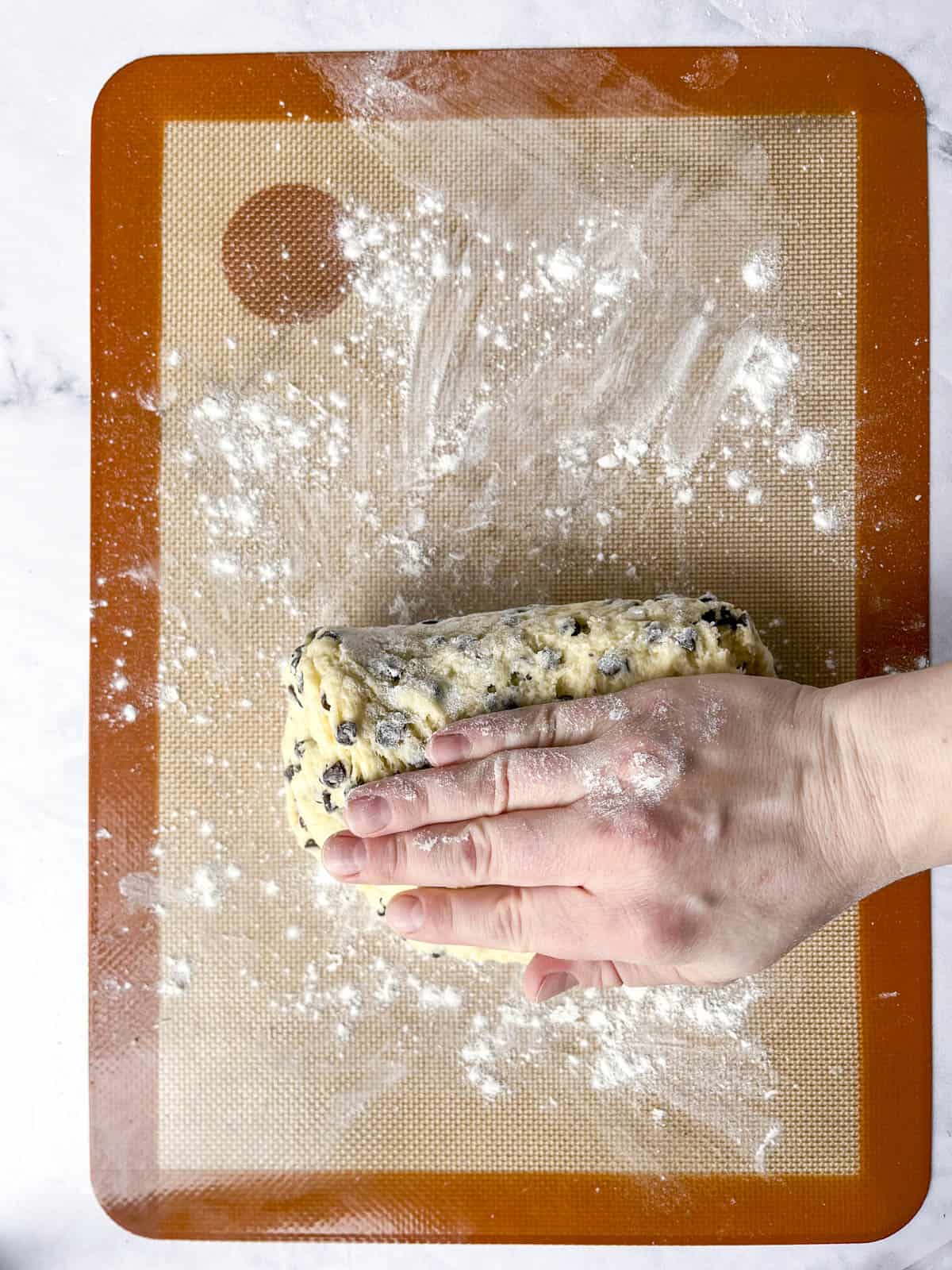
- Fold dough. Lamination (folding the dough to create flaky layers!): Fold the dough in half, press it down slightly, then turn the dough 90 degrees and fold in half again. Repeat this folding and turning process 4-5 times.
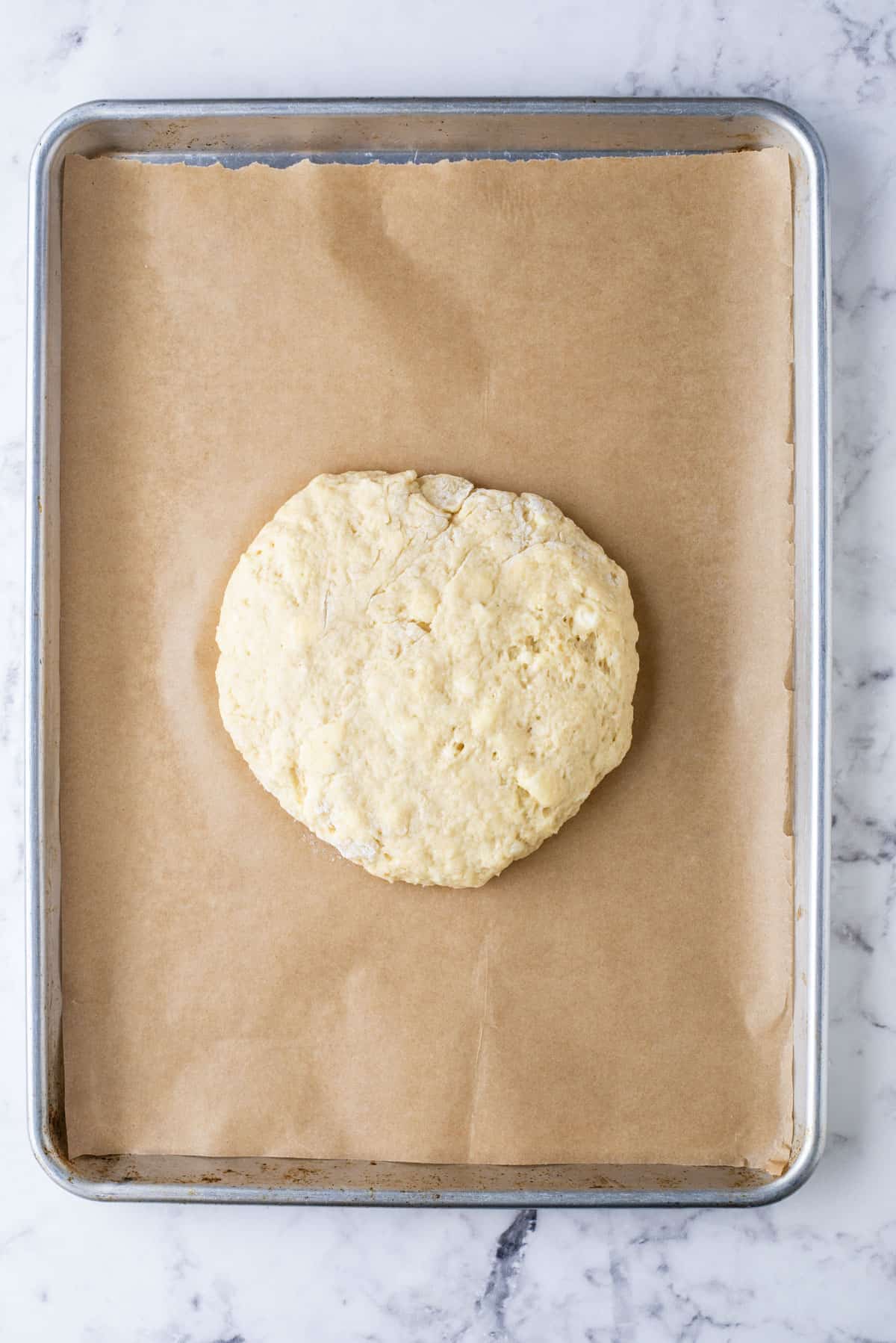
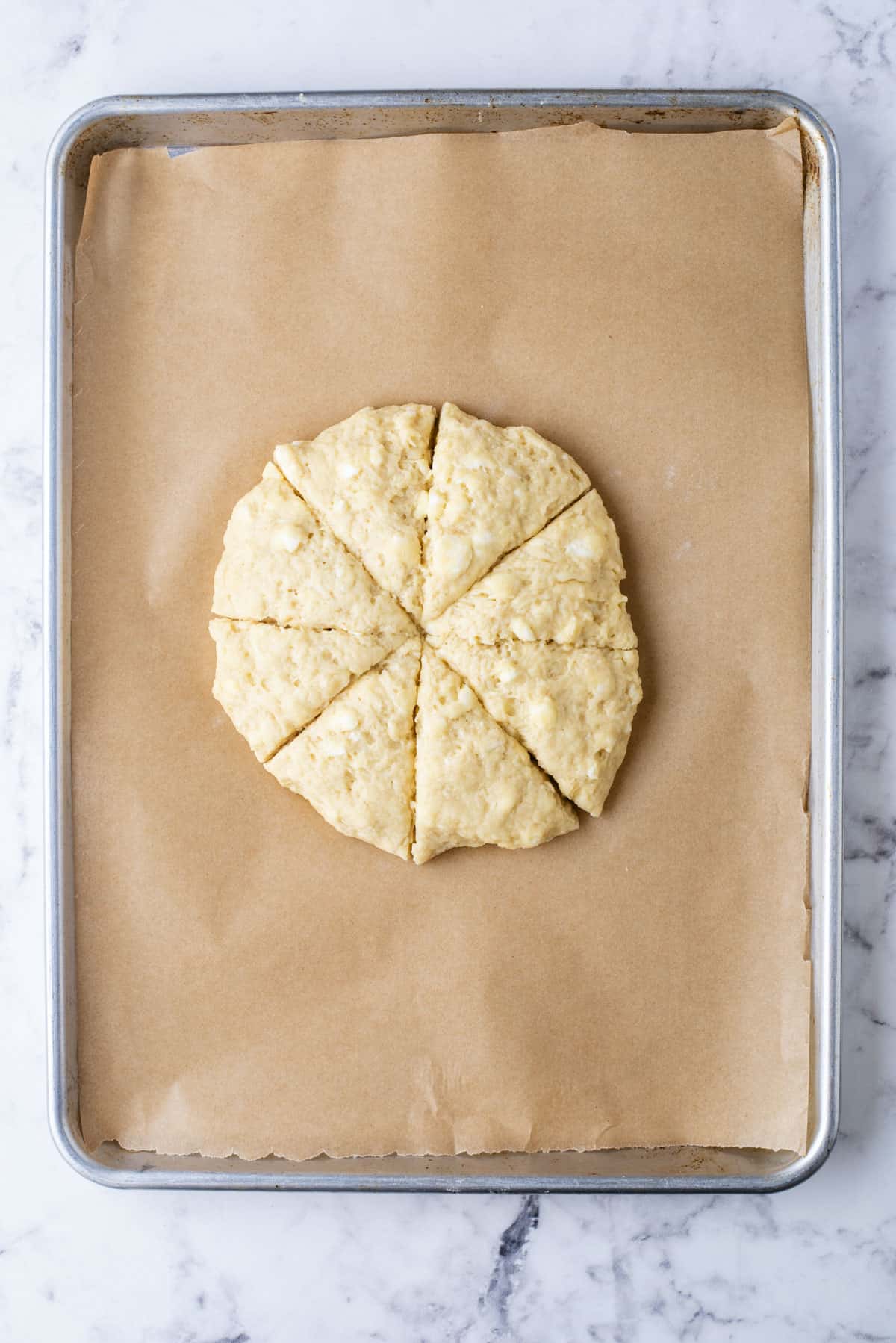
- Shape and chill dough. Shape the dough into a 8-10 inch disc that is about 1.5 to 2 inches tall. Refrigerate the scone in a disc for 5-10 minutes.
- Cut. Use a sharp knife or pizza cutter to cut the scones into 8 equal wedges.
- Move to baking sheet. Place the scones 2-3 inches apart on a lined baking sheet that’s lined with a silicone mat or parchment paper.
- Freeze. Freeze the unbaked scones for 30 minutes. The last 5 minutes, preheat the oven to 400º F.
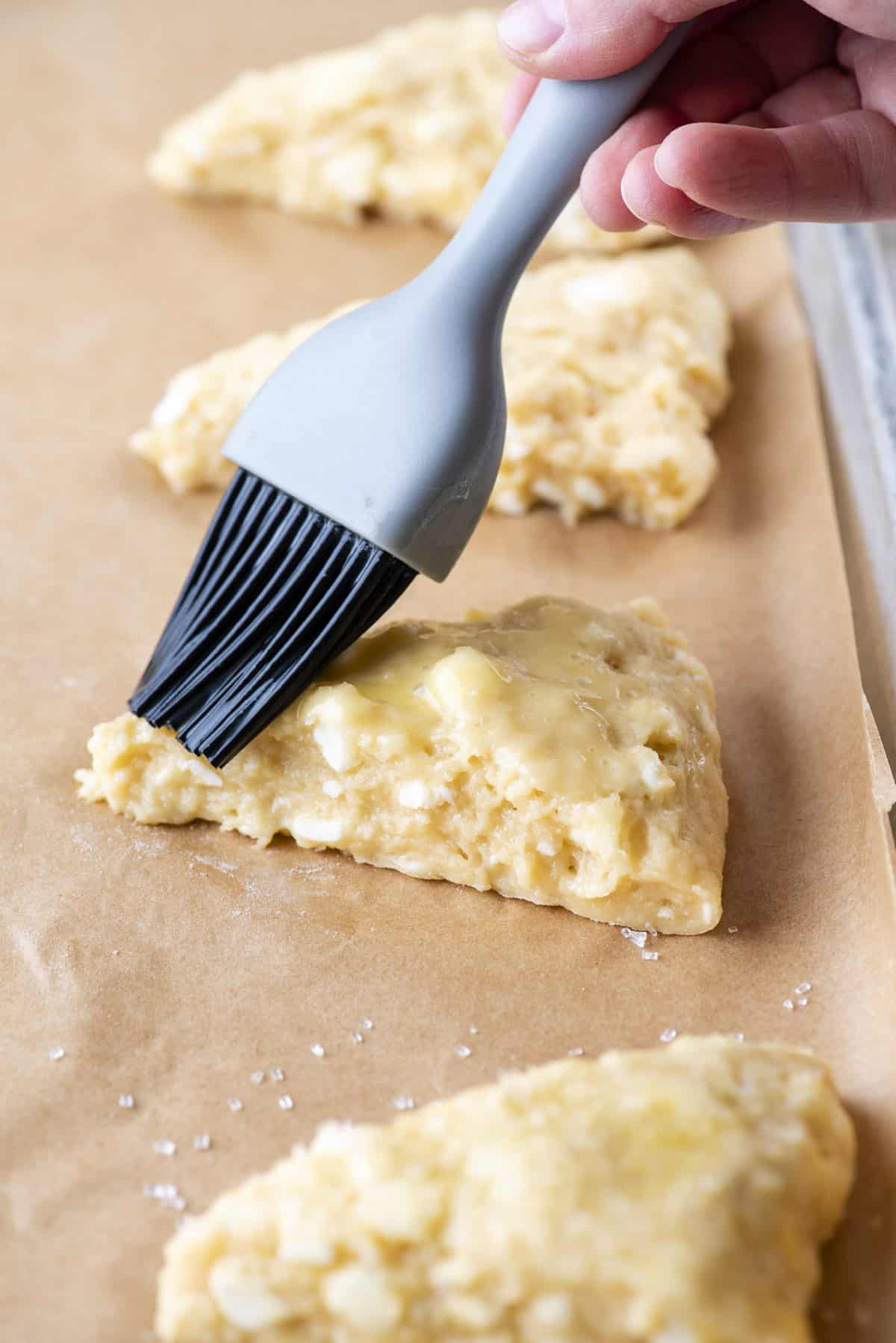
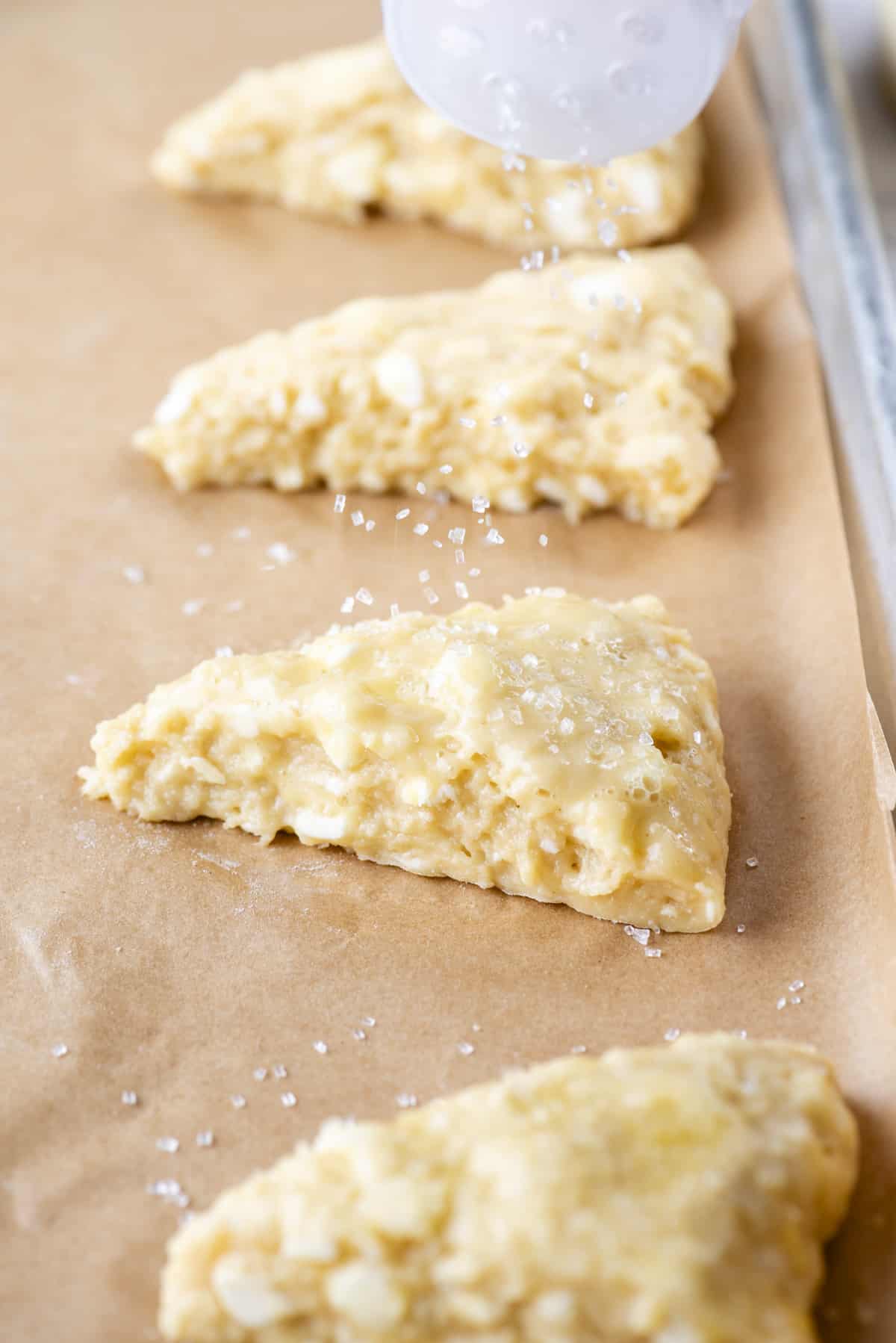
- Add egg wash. Brush the tops of the scones with egg wash (1 large egg + 1 Tbsp water), buttermilk or heavy cream. Add coarse sanding sugar if desired.
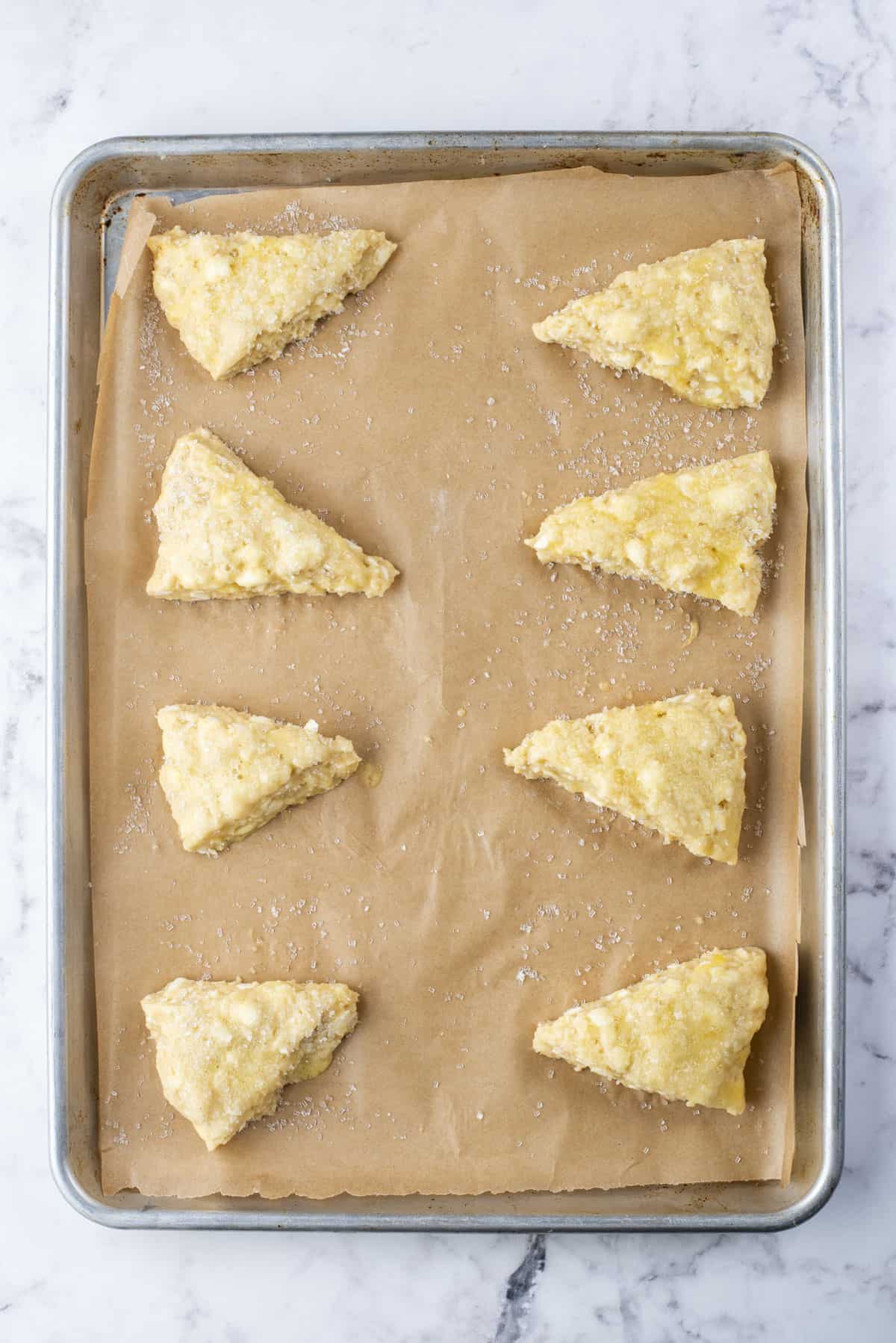
- Bake and cool. Bake on the prepared baking sheet for 20-26 minutes or until the scones are lightly golden. Allow them to cool.
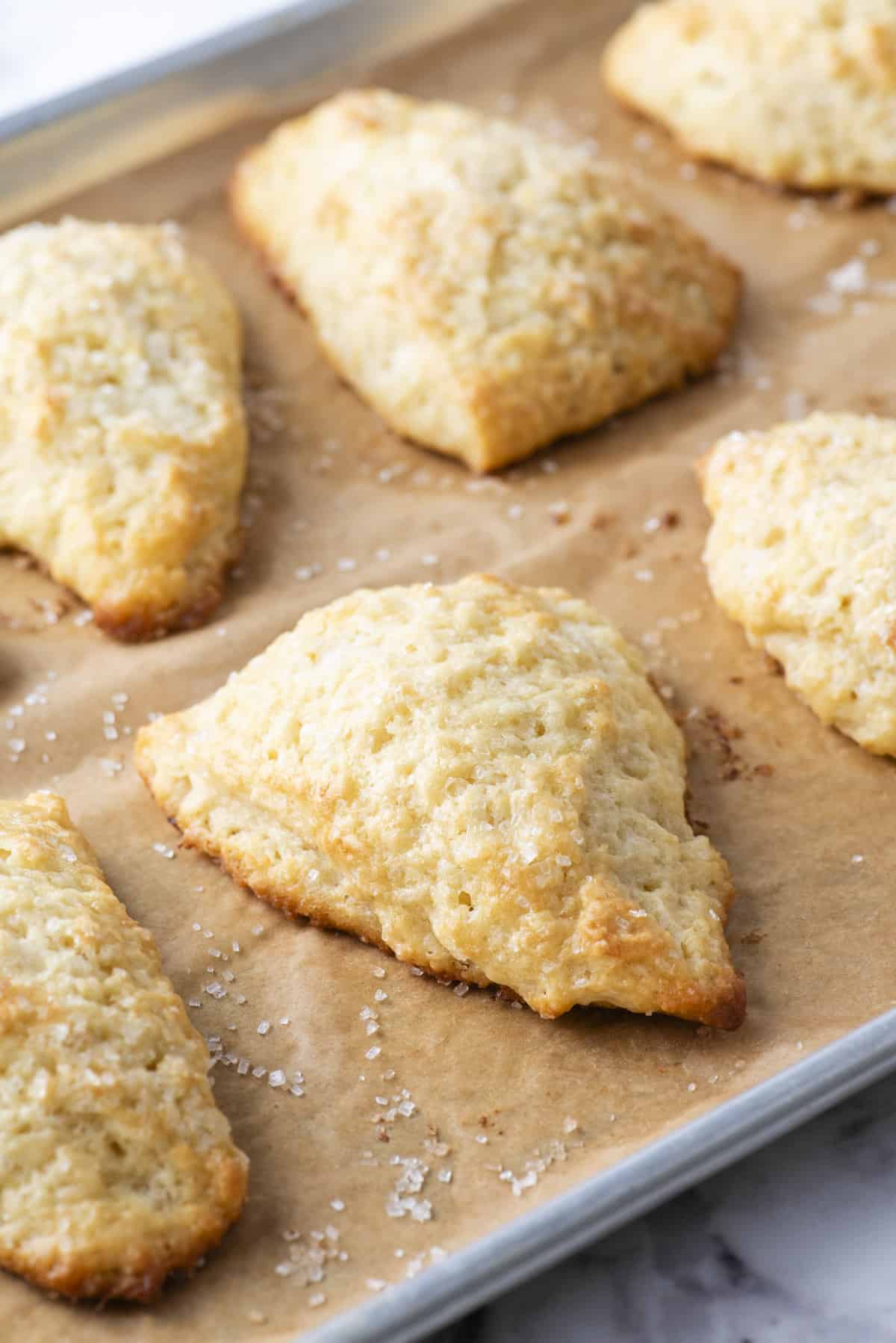
Best Scones Recipe Tips
For best results, follow these tips:
- Use cold unsalted butter: Starting with cold butter is key to success in this recipe. You can even cube and then freeze your butter before making your scone dough.
- Use only 1 cup of fresh fruit: When adding fresh or frozen fruit to your scones, be sure to only add a total of 1 cup. Adding more than 1 cup can cause the batter to become too moist, causing it to spread in the oven.
- Adjust flour for fruit scones: If making fruit scones, like raspberry, add an additional ¾ cup flour (90 grams). If making blueberry or strawberry scones add an additional ¼ cup flour (30 grams). The fresh fruit adds a lot of moisture so more flour is needed otherwise the dough will be very wet and not have enough structure when baking.
- Don’t skip the freezing step: Freezing scones before baking helps maintain their shape, prevents excessive spreading, and enhances the texture of the scone by keeping the butter cold. Scones are delicate and prone to spreading during baking. Freezing the dough helps to firm up the fat (the butter) in the dough which prevents excessive spreading and helps them retain their shape during baking. When these cold chunks of butter hit the heat of the oven, they create steam, which contributes to the flakiness and lightness of the scones.
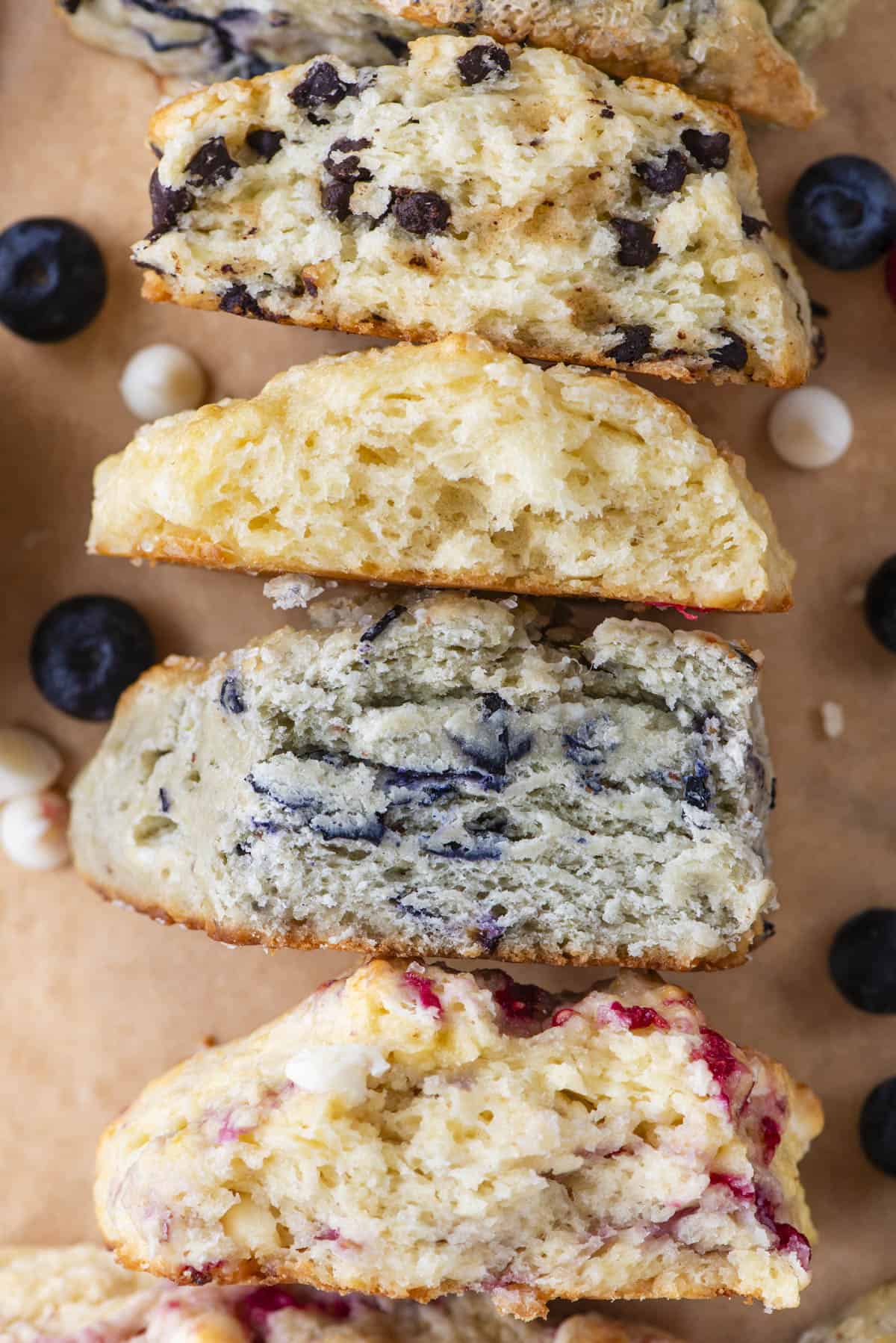
How To Make Tall, Flaky Scones
Lamination, which is the process of folding the dough, helps to create tall, flaky scones!
Lamination works by sandwiching layers of butter between layers of dough. During baking, the butter melts and creates steam, which separates the layers of dough, resulting in a flaky texture.
The process of laminating scones is actually very easy! Once the dough is mixed together, fold the dough in half, press it down slightly, then turn the dough 90 degrees and fold in half again. Repeat this folding and turning process 4-5 times.
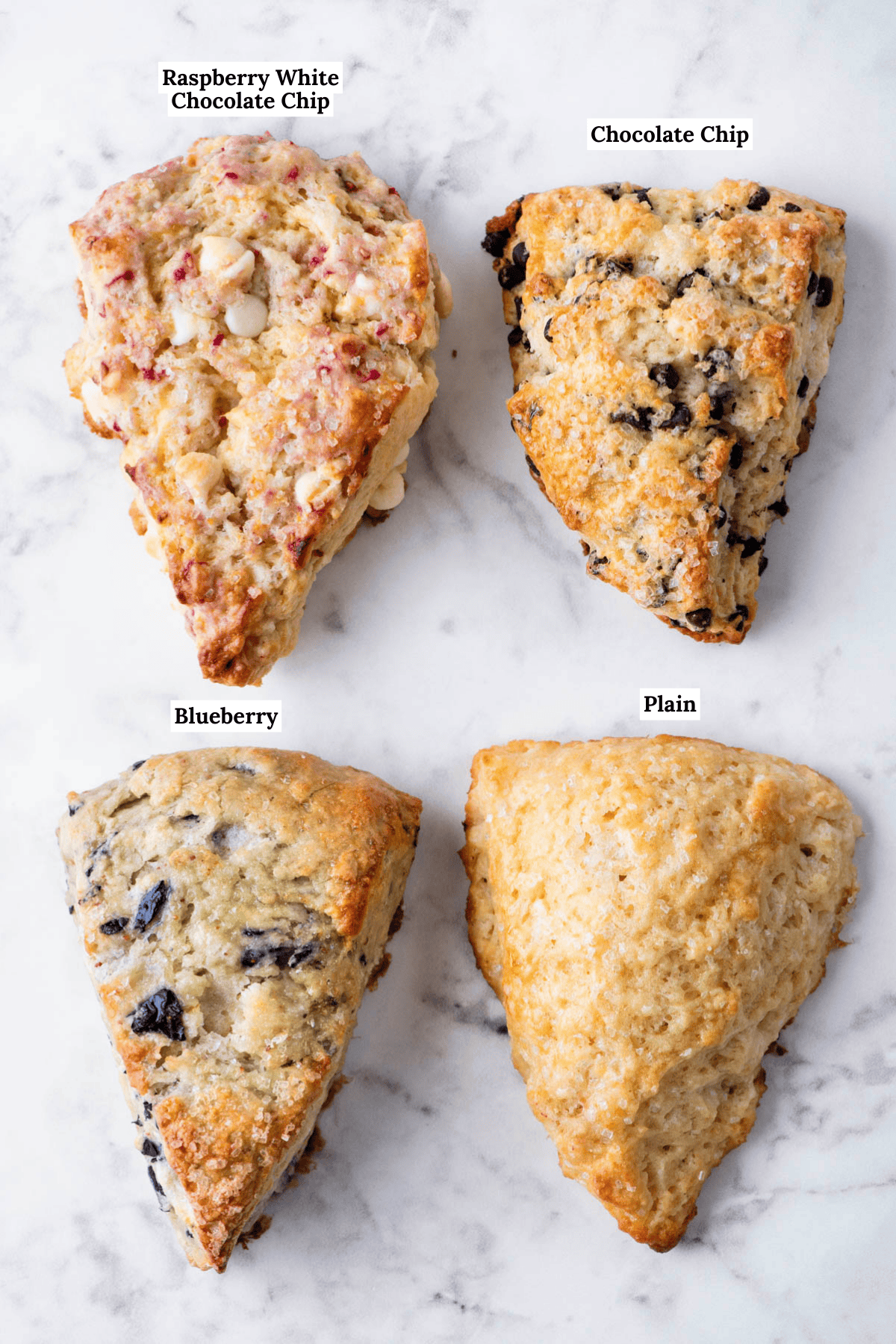
Scone Flavors
This recipe works great with any of your favorite add-ins. Here are some flavor ideas:
- Plain – This classic scone recipe makes perfect buttery scones that can be enjoyed as-is without any add-ins.
- Raspberry White Chocolate Chip – 1 cup fresh raspberries, broken into pieces and frozen + 1 cup white chocolate chips
- Chocolate Chip – 1 cup semi-sweet chocolate chips (I like to use mini chips.)
- Blueberry – 1 cup blueberries
- Cranberry Orange – Zest of 2 oranges + 1 cup frozen cranberries
- Strawberry – 1 cup strawberries, chopped
- Lemon Poppy Seed – Zest of 3 lemons + ½ Tbsp poppy seeds
- Lemon Blueberry – Zest of 3 lemons + 1 cup blueberries
How to Make Gluten Free Scones
I’ve also made this recipe with gluten free flour with awesome results! I recommend King Arthur’s Gluten Free Measure for Measure Flour. Use it as a one for one substitute for regular flour.
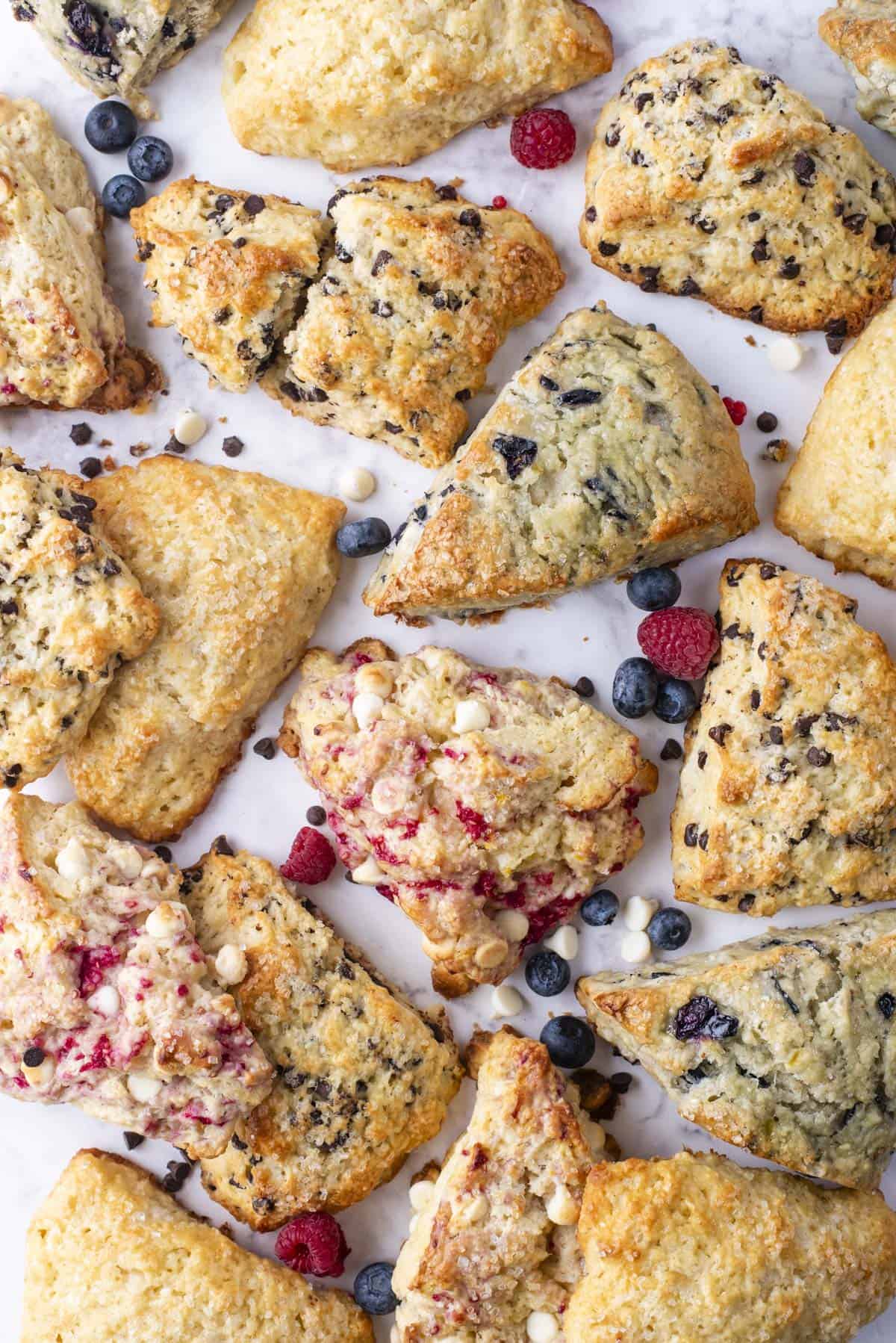
How to Store this Recipe for Scones
To store scones, first make sure they cool completely. If you seal them up in a container while still warm, the condensation can make them soggy. Once completely cooled, store the scones in an airtight container or ziploc bag in a cool, dry place at room temperature for 1-2 days. Avoid refrigerating as they can dry out the scones.
If you need to store them for longer, you can freeze them for up to one month. Just thaw them at room temperature before serving.
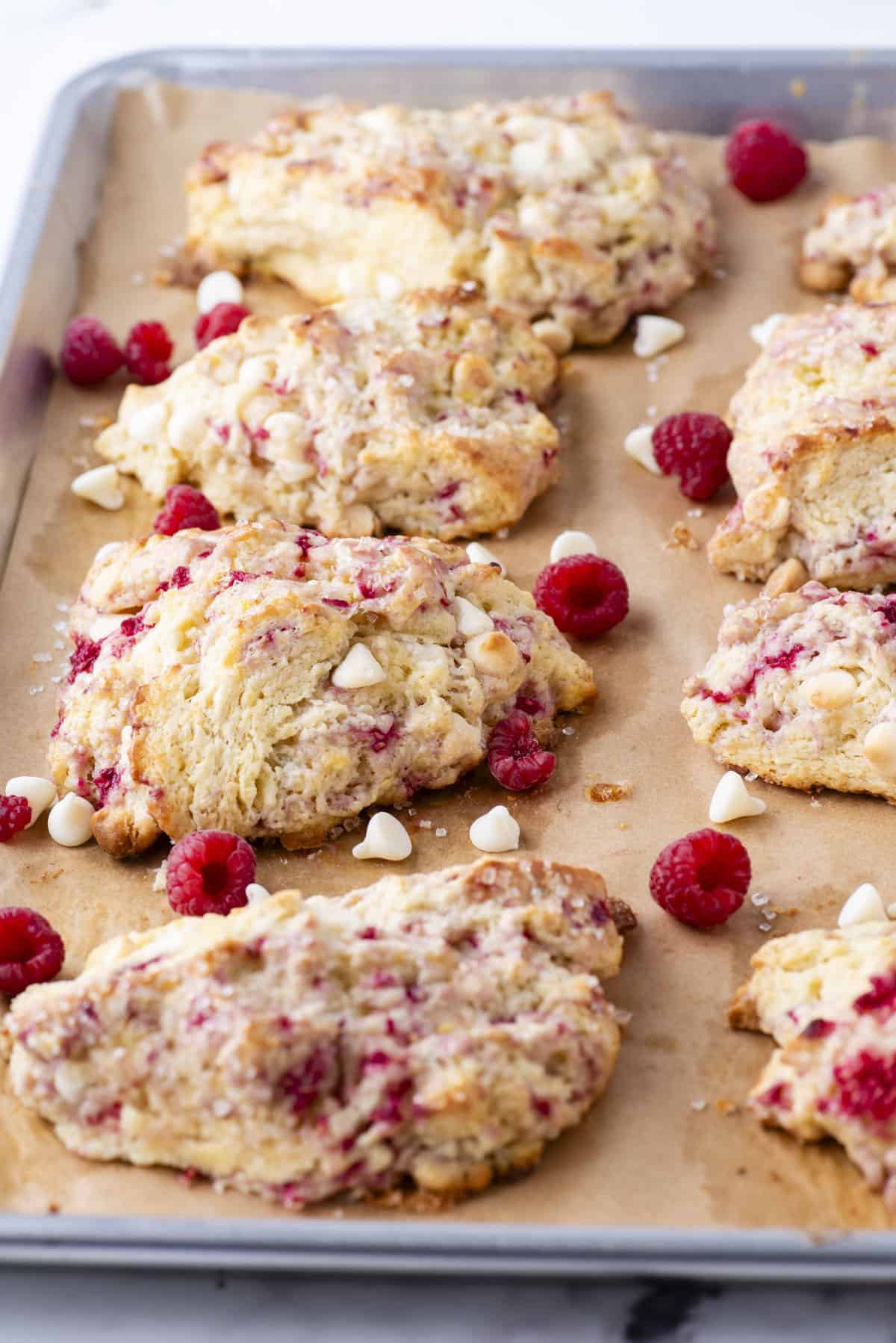
More Baked Goods Recipes
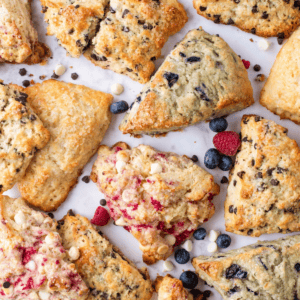
Tap stars to rate!
Recipe for Scones
Equipment
Ingredients
Plain Scones
- 2 ¼ cups (270g) all-purpose flour
- ½ cup (99g) granulated sugar
- 1 Tbsp baking powder
- ½ tsp salt
- ½ cup (113g) cold unsalted butter, cubed
- ½ cup (118ml) buttermilk
- 1 tsp vanilla extract
- 1 large egg
Add-Ins, optional, add a total of 1-1.5 cups
- 1 cup (170g) chocolate chips, I used mini chocolate chips in the photos
- 1 cup (170g) white chocolate chips
- 1 cup (120g) fresh raspberries, broken into pieces and frozen
- 1 cup (150g) blueberries
- 1 cup (167g) strawberries, chopped
Video
Instructions
- If making raspberry scones add an additional ¾ cup flour (90 grams). If making blueberry or strawberry scones add an additional ¼ cup flour (30 grams). The fresh fruit adds a lot of moisture so more flour is needed otherwise the dough will be very wet and not have enough structure when baking.
- In a large mixing bowl combine the flour, granulated sugar, baking powder, and salt. Add in the cold, cubed butter and use your hands or a pastry cutter to cut in the butter until pea sized amounts of butter remain.2 ¼ cups (270g) all-purpose flour, ½ cup (99g) granulated sugar, 1 Tbsp baking powder, ½ tsp salt, ½ cup (113g) cold unsalted butter
- Create a well in the center of the flour mixture. Add the buttermilk, vanilla extract, and egg. Use a spatula to gently combine until the dough is thick and sticky. Gently stir in your mix-in if using – example 1 cup chocolate chips, 1 cup fresh raspberries, broken into pieces and frozen, 1 cup blueberries, OR 1 cup strawberries, chopped.½ cup (118ml) buttermilk, 1 tsp vanilla extract, 1 large egg
- On a silicone mat or kitchen counter, gently knead the dough, until all the flour is incorporated. Add 1-2 additional tablespoons of flour if the dough is too sticky.
- Lamination (folding the dough to create flaky layers!): Fold the dough in half, press it down slightly, then turn the dough 90 degrees and fold in half again. Repeat this folding and turning process 4-5 times.
- Shape the dough into a 8-10 inch disc that is about 1.5 to 2 inches tall. Refrigerate the scone in a disc for 5-10 minutes.
- Use a knife or pizza cutter to cut the scones into 8 equal wedges.
- Place the scones 2-3 inches apart on a baking sheet that’s lined with a silicone mat or parchment paper.
- Freeze the scones for 30 minutes. The last 5 minutes, preheat the oven to 400º F.
- Brush the tops of the scones with egg wash (1 large egg + 1 Tbsp water), buttermilk or heavy cream. Add coarse sanding sugar if desired.
- Bake for 20-26 minutes or until the scones are lightly golden. Allow the scones to cool.
Notes


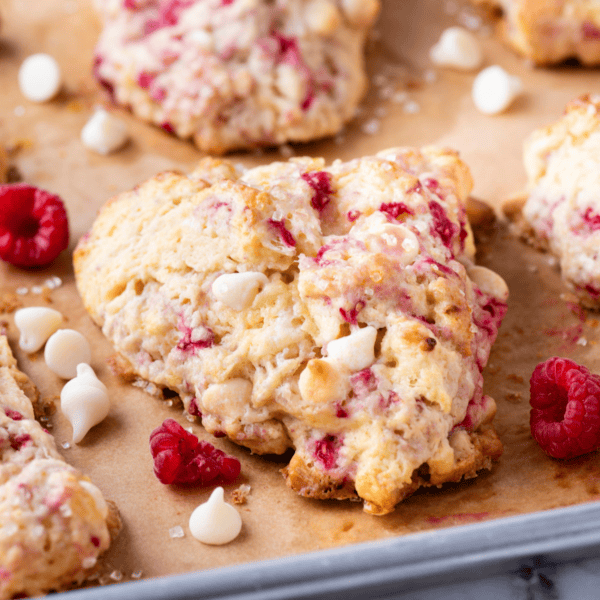
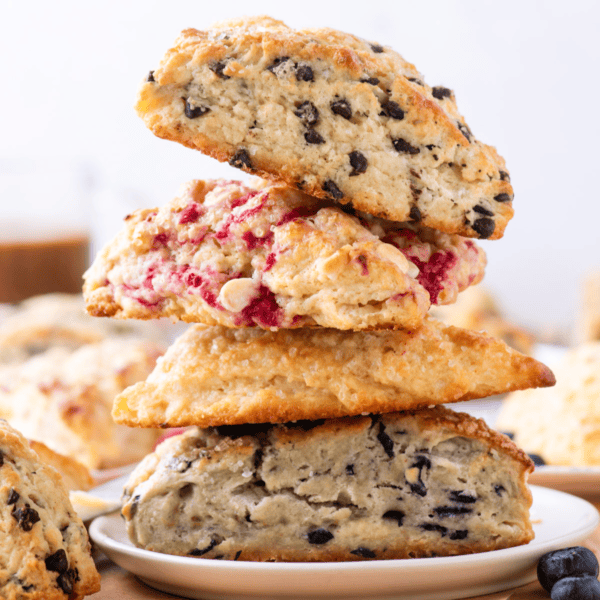
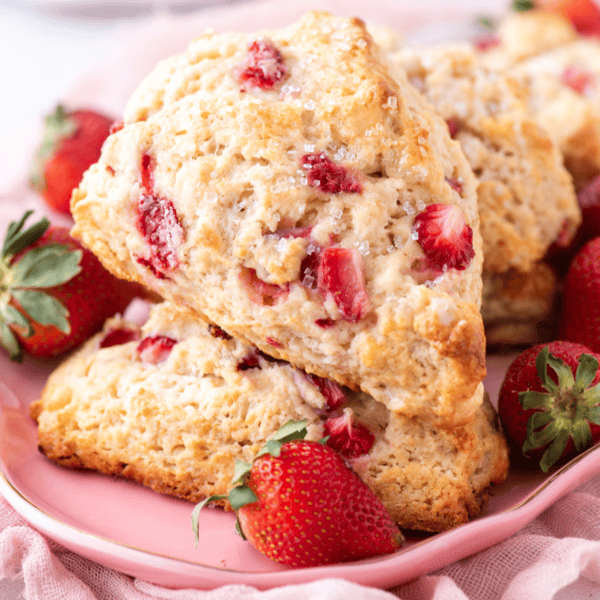
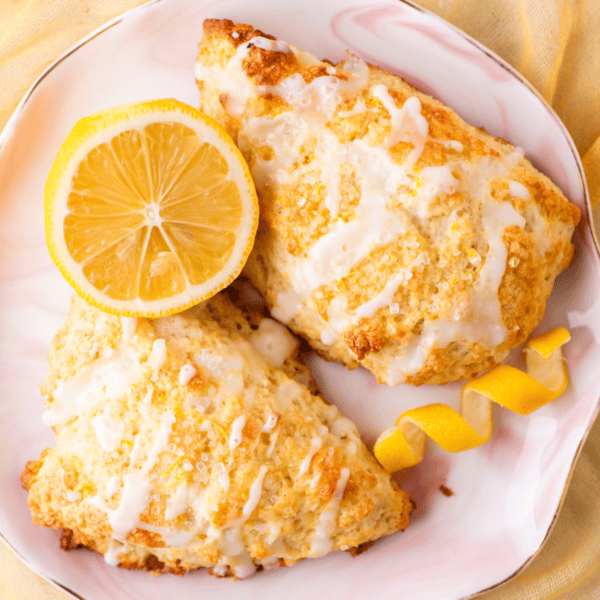






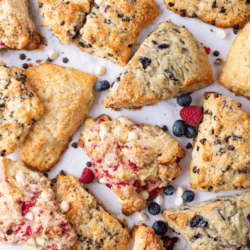
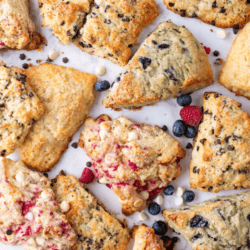






Hello,
Would you happen to have a recipe for cinnamon scones